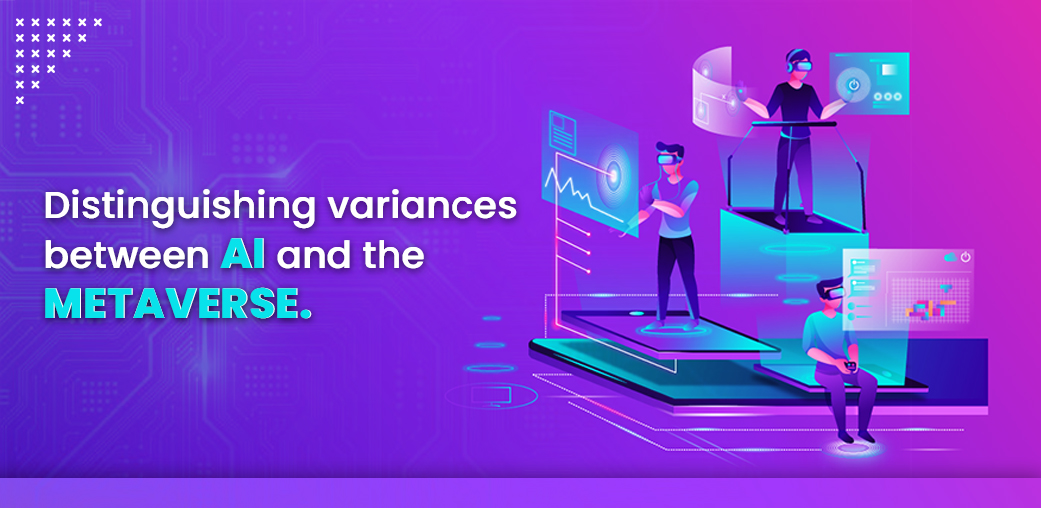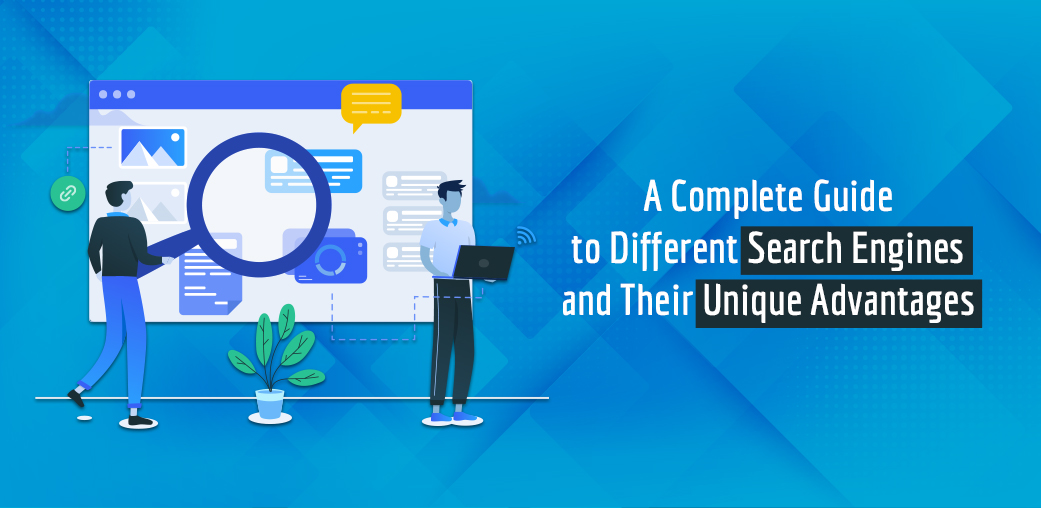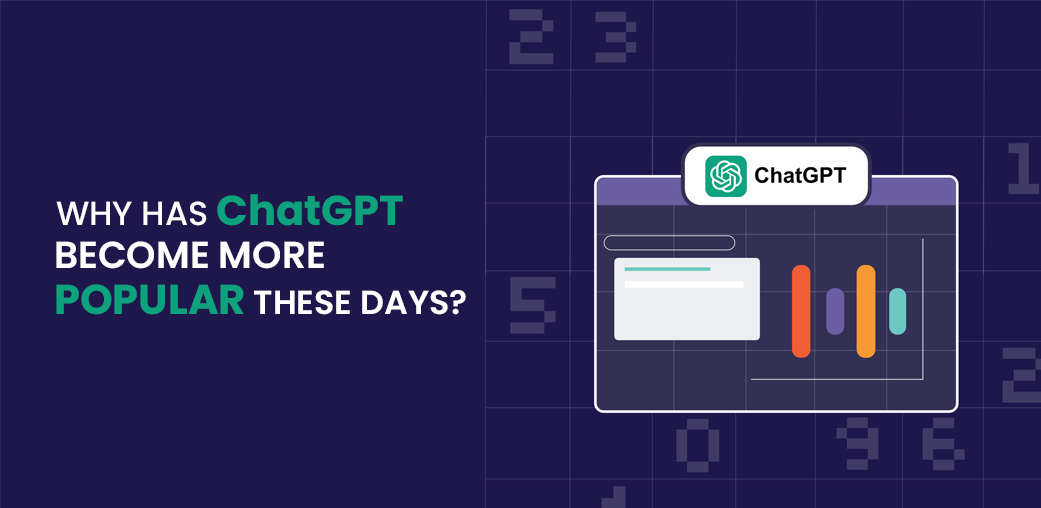Distinguishing variances between AI and the Metaverse.
Introduction:
In the fast-moving world of tech, two big ideas are leading the way and changing how we do things online- Artificial Intelligence (AI) and the Metaverse. They’re both really important, but it’s crucial to know the differences between them to see how each one is making our digital world better in its own special way.
Artificial Intelligence (AI):
AI, the pioneer of modern computers, means creating computer systems that can do things smart people do. These things include learning, figuring things out, solving problems, understanding how people talk, and knowing what’s going on. AI systems are made to get better and better as they go, learning from what happens and the information they get.
Machine Learning (ML) is like a smart helper for computers. It helps them figure out patterns and make guesses without someone telling them exactly what to do. Deep Learning is a special kind of ML that uses networks to copy how people make decisions. AI does lots of things, like virtual helpers, suggesting things you might like, self-driving cars, and really advanced medical tools.
The Metaverse:
The Metaverse is like a mix of the real world and the internet. It’s a space where our physical and digital lives come together, making a shared virtual world that feels real and lets us do things together. The Metaverse includes things like augmented reality (AR) and virtual reality (VR), which make it hard to tell what’s real and what’s not. People can use avatars to explore this digital world, meet others, and even do business.
The metaverse isn’t just one big thing. Instead, it’s like a bunch of virtual spaces all connected together. Companies, such as Meta (used to be Facebook), are putting a lot of money into making the metaverse. They think it’s the next step for the internet, where people can easily go from one virtual place to another.
Distinguishing Variances:
Nature of Interaction:
* AI primarily focuses on enhancing computer systems’ cognitive abilities, enabling them to perform specific tasks autonomously.
* While this is like a digital world where people can hang out together, talk, and work together. It’s a place where everyone can join in and do things together.
Application Scope:
* AI can do many things, like understanding speech and pictures, driving cars on its own, and helping with medical diagnoses.
* It is like a cool online world where you can hang out with friends, play games, have work meetings, and do lots of fun stuff together.
Data Utilization:
* AI needs lots of information to learn and get better as time goes on.
* The Metaverse grows and changes with the help of things made and done by users. This makes a lively and inclusive world for everyone to be a part of.
Time Frame:
* For many years, people have been working on making AI better and better. It keeps getting smarter and can do more things.
* This is a new idea that’s still getting started. People are working on it and trying things out to see what amazing things it can do.
Conclusion:
In conclusion, these are both really powerful technologies, but they do different things in the digital world. AI makes machines smarter and better at computing, while the Metaverse creates a cool virtual space for fun and interactive experiences. It changes how we connect and work together in the digital world. It’s important to know the differences between these ideas to understand how they will change technology and how we interact with each other. As these technologies get better, working together, AI and the Metaverse might bring even cooler things, changing how we live in the digital world.
“Finding Your Way Online: A Complete Guide to Different Search Engines and Their Unique Advantages”
Introduction:
In the contemporary age of digital technology, search engines play a pivotal role in how we access information, connect with businesses, and explore the vast realm of the internet. While Google is undoubtedly the giant in the search engine domain, there are various alternatives, each offering distinct advantages. Here, we’ll delve into the world of different search engines, highlighting the strengths and advantages that make them stand out.
1. Google: The King of Search
– Advantage: Unrivaled Algorithm
– Google’s sophisticated algorithms consistently deliver relevant and accurate results, making it the go-to search engine for users worldwide.
– Personalized search features, such as Google My Business, provide businesses with a powerful tool for local visibility.
2. Bing: The Visual Search Pioneer
– Advantage: Visual Search Capabilities
– Bing excels in visual search, allowing users to search using images and discover related content efficiently.
– Integration with Microsoft products enhance the user experience, especially for those already using Windows and Office.
3. Yahoo!: A Legacy in Web Search
– Advantage: Diverse Content and Services
– Yahoo! is more than just a search engine; it offers a variety of content and services, including news, email, and entertainment, providing users with an all-in-one experience.
4. Baidu: Dominating the Chinese Market
– Advantage: Mandarin Language Dominance
– Baidu is the leading search engine in China, understanding the complexities of the Mandarin language and catering to the unique needs of the Chinese user base.
5. DuckDuckGo: The Privacy Advocate
– Advantage: Enhanced Privacy Features
– DuckDuckGo distinguishes itself by prioritizing user privacy, offering anonymous searching and avoiding personalized search results and targeted ads.
6. Yandex: The Russian Search Giant
– Advantage: Localization for Russian Users
– Yandex focuses on understanding and meeting the needs of Russian-speaking users, providing localized search and a range of additional services.
7. AOL Search: A Relic in the Digital Landscape
– Advantage: Integrated Services
– Although not as prominent as it once was, AOL still provides integrated services, catering to users within the AOL ecosystem.
Conclusion:
In conclusion, the world of search engines is diverse, offering users and businesses a range of choices based on their specific needs and preferences. While Google remains the dominant force, each search engine comes with its own set of advantages, whether it’s privacy-focused searching, visual search capabilities, or catering to specific linguistic and regional requirements. Understanding these distinctions empowers users and businesses to make informed choices in navigating the digital landscape.
Why has ChatGPT become more popular these days?
Introduction
In recent years, artificial intelligence has made big changes in how we use technology and the online world. One example is ChatGPT, a smart computer program created by OpenAI. Lots of people are talking about it because it’s good at lots of things and has changed the way we use talking computer programs. Let’s find out why ChatGPT is getting more popular.
1. Natural Language Understanding
This has become really popular because it’s super good at understanding and making text that sounds like it came from a person. Unlike old chatbots that followed fixed rules, this uses smart computer learning to understand human language better. It can understand what you’re talking about, keep the conversation going smoothly, and give answers that make sense, making it feel like you’re talking to a real person.
2. OpenAI’s Commitment to Improvement
OpenAI has been working really hard to make this better and better. They listen to what users have to say and use that feedback to improve the model. This means it gets updated regularly and keeps getting better. This way, it stays up-to-date and becomes more helpful for different things, fixing any problems it might have along the way.
3. Accessibility
This is getting easier for people all around the world to use. At first, it was just for researchers, but now more people can use it. This helps businesses, developers, and regular folks add it to their stuff like products, services, and apps. The simple interface and fair prices make it simple for it to be used in many different areas.
4. Versatility
This is very popular because it can be used for many different things. It can work as a helpful in customer service, generate content, translate languages, and do much more. This makes it useful for both businesses and people who want to make their work easier and give better service to users.
5. Reducing Language Barriers
In a world where people from all over come together, it’s really important to be able to talk to each other, even if we speak different languages. This can help by turning words from one language into another, so we can talk better with folks who speak differently. This can really help in business, school, and just talking to new friends.
6. AI in Content Generation
Creating content takes a lot of time, like writing stuff, making reports, or marketing materials. This is really helpful for making content. It helps people and groups save time and energy. It can help with writing, fixing, and coming up with ideas for content, which makes writers and content creators get more stuff done.
7. Enhanced User Experiences
This is really good at talking with people in a way that makes sense and feels right. This makes people happy, so they talk to it for a long time and keep coming back. This is super important in the world of computers and the internet, where lots of companies are trying to be the best.
8. Ethical Considerations
OpenAI’s way of making AI and ChatGPT is famous because they care about doing it right. They have rules and limits to stop people from using it the wrong way. This makes people feel better and trust that AI is being used carefully and responsibly.
Conclusion
This has unquestionably gained more popularity in recent times because of its natural language comprehension, ongoing enhancements, accessibility, adaptability, role in breaking down language barriers, content generation skills, improved user interactions, and ethical considerations. As it keeps advancing and finding uses across different fields, its influence on our digital exchanges and everyday routines is bound to expand, solidifying its status as an indispensable tool for individuals and businesses seeking to harness the capabilities of artificial intelligence.


